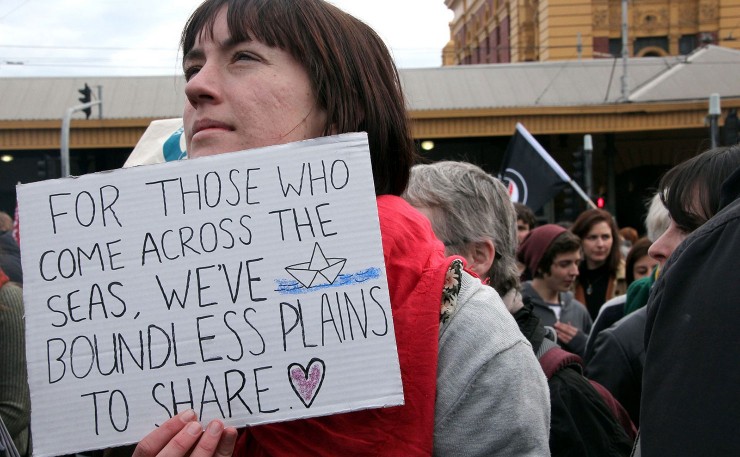Among many other issues raised last night at the UN were the treatment of First Nations peoples and those with a disability. Max Chalmers reports.
Australia has been inundated with concerns about its record on human rights, being handed almost 300 recommendations on how to improve its standing in the eyes of the global community and ensure it is not breaching international obligations.
Representatives from 110 nations lined up last night to provide feedback as part of the United Nations Human Rights Council’s regular periodic review, a process that sees member states come before the council to check in on their progress over the previous four and a half years.
Chief among the concerns of Australia’s peers was the treatment of refugees and First Nations peoples.
Professor Sarah Joseph, who was in Geneva to watch the session as the Director of Monash University’s Castan Centre for Human Rights, said there was “little indication” the international community had bought Australia’s justification for its hardline anti-refugee policies.
“Boat turn backs, mandatory detention and offshore detention are not praised around the world,” Professor Joseph told New Matilda. “They are not a roadmap for the global treatment of refugees. The international community has spoken. They are a breach of international human rights law.”
At AI side event on Indigenous issues prior to UPR. That’s the Hon Phillip Ruddock’s head #AusUPR #UPR23 pic.twitter.com/ZFkOIodlRg
— Sarah Joseph (@profsarahj) November 9, 2015
Countries as diverse as Afghanistan, China, the United States, and North Korea encouraged Australia to adjust its treatment of the issue and improve oversight of detention centres. The US recommended Australia “closely monitor” the processing of refugees in offshore centres to ensure their human rights were respected. “We recognise Australia’s robust history of protecting its citizens’ civil and political rights. We encourage Australia to ensure humane treatment and respect for the human rights of asylum seekers, including those processed offshore in Papua New Guinea and Nauru,” the US mission’s Divya Khosla said. “Some may focus on the spectacle of countries like North Korea criticising our human rights record,” said Professor Joseph. “But 110 countries from all over the world have given their views – although we have much to be proud of, there are numerous areas where our human rights record must be improved.”
Australia’s treatment of asylum seekers was criticised by the majority of countries at #UPR23. It’s time for @TurnbullMalcolm to act.#AusUPR — Shane Bazzi (@shanebazzi) November 9, 2015
Australia’s treatment of First Nations peoples featured prominently, with the US noting concerns about the potential closure of remote Aboriginal communities in Western Australia.
Cuba: high level of women in prisons; excessive force by police against minorities & Indigenous people; review policies re Indigenous #UPR23
— Tammy Solonec (@TammyAmnestyOz) November 9, 2015
Uruguary: Take measures to reduce imprisonment of Indigenous peoples; increase age of criminal responsibility #UPR23 #AustUPR — Tammy Solonec (@TammyAmnestyOz) November 9, 2015
USA: consult Indigenous people re remote communities; provide transitional support & access to traditional lands #UPR23 #SOSBLAKAUSTRALIA — Tammy Solonec (@TammyAmnestyOz) November 9, 2015
In defending the country’s record the Australian delegation pointed to its commitment to a plebiscite on same-sex marriage, support for international aid, and one-off commitment of $44 million in humanitarian aid to help displaced Syrians and Iraqis, among other things. The delegation omitted to note Australia’s foreign aid has seen a substantial cut under the current government.
Aus Human Rights Comm pres @GillianTriggs says Aus #UPR23 response to qs from >100 nations had been at some points, “deeply misleading”. — Adam Connors (@adamconnorsnews) November 9, 2015
On a more positive note, the National Disability Insurance Scheme drew consistent praise, though concerns were raised about a range of other issues impacting people with a disability.
Therese Sands, Co-CEO of People with Disability Australia, said the issue of forced sterilisation was one among those raised last night.
“Violence against people with disability – particularly those in institutional and residential settings – is an urgent, unaddressed national crisis,” Sands said.
“It has a devastating impact on some of the most vulnerable and marginalised people in our communities, particularly women and children with disability, Aboriginal and Torres Strait Islander people with disability and people with disability from non-English speaking and culturally and linguistically diverse backgrounds. It occurs because of failures in legislation, policy and service systems, and it is time for Australia to now act decisively.”
Professor Joseph said the acknowledgement of disability issues had been pleasing but that Australia had a long way to go in ending discrimination and violence against people with a disability.
Donate To New Matilda
New Matilda is a small, independent media outlet. We survive through reader contributions, and never losing a lawsuit. If you got something from this article, giving something back helps us to continue speaking truth to power. Every little bit counts.





